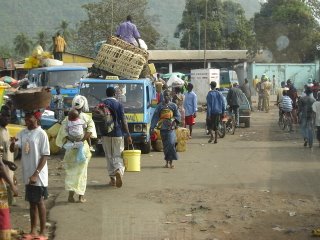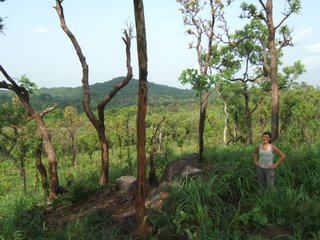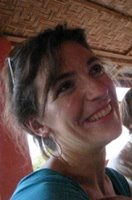INDUSTRY OR BETRAYAL? Banfelian Termites Remain Active Through Strike (07/24/06)

EVENTS
THE STRIKE-what can I tell you that your comprehensive minute-by-minute BBC coverage has not expertly conveyed? Perhaps that Guinea saw a massive national nine-day strike in June. Teachers and other public officials protested stagnating salaries, and soaring pricing of rice and gas (34% in three months), resulting in student-led protests across the country. Twenty students were killed in Conakry, 4 looters in Labe and Zerekore combined. On day nine, the unions agreed to “suspend the strike” contingent on Government promises of salary increases and a decrease in the price of rice.
The strike in Banfele was quite a different story. Cows mooed, goats bahed, women were marginalized. Men discussed the World Cup and termites feasted on my hut and fence.
We did feel it, though. The price of black market gas soared to over 10 mil a liter, sold in honey colored whisky bottles in wood stands on the side of the road. The Doctor worried how he would complete his vaccination tournee to the villages, and radioed Faranah and Kouroussa daily to check on gas supplies. French-speakers listened religiously to the radio, relying on the BBC, the international news source, for the most accurate information on what was happening in our Capitol (although we listened to the state news as well). It was surreal to hear bulletins like “negotiators for the Guinean Government and Trade Unions have yet to reach an agreement after Monday’s violent protests.” Those remote, repetitious reports of violence and social unrest in Africa were happening in my Capitol, so near, and I was drinking tea and working on a pepiniere in Banfele.
Peace Corps Admin declared a standfast, requiring that all volunteers remain at site, the safest, if loneliest, place during social upheaval. I lived for my 30-minute radio conversations with Annaliese, the kind Health APCD (Asistant Peace Corps Director), who diligently called me on the Haute Guinea Frequency to give status updates every few days (I did not have the Peace Corps Frequency yet). I desperately wanted to mull over the possibility of evacuation with fellow PCV’s and felt my distance acutely.
We are naturally relieved that service has not been truncated and violence has ceased. But there is an ambiguous quality to it, an interlaced sadness; not to suggest that violence is the only or best way to effect social change, but it merits acknowledgement that the same lack of resentment and class consciousness--a certain complacency--that suspends the strike, and allows the Peace Corps to flourish peacefully, perhaps also prevents Guinea from moving forward.
WORLD CUP—World Cup in the Village is a bit like slap bracelets in my middle school (so cool). With the newly installed satellite dish in the community center, fortuitously but not surprisingly procured the day of the first match, functionaries struggle to (and succeed consistently at) fitting daily viewing into their tight schedules and budgets. Even without the incessant BBC updates and despite never attending the viewing, I know what’s happened: When any country whose inhabitants are not black loses, Banfelians walk by me grinning smugly, or outright gloating. Similarly, when a “non-black” team wins, quietly resentful or fullblown vindictive glances give instant insight into the final score. “I really have no feelings for Czechoslovakia one way or another,” I assure Kelema, the Secretaire Communautaire, who is convinced I am grief-stricken by Ghana’s surprise win over this country whose name I can’t spell. “I swear, I am really not here to colonize you,” I say. He laughs.
ANECDOTES
HOME MAINTENANCE--The rains here are not that odd relic of the power of nature, that makes your morning drive to work a little more annoying. The winds bluster thru the tallest mango trees, women quickly pull laundry off fences and place tin buckets in their yards for water collection (and the pump line is mercifully short the next day). The mosquitos cower somewhere pleasantly far from your ankles and a dark bulbous purple cloud or a grey sheet visibly approaches the town. A couple potent droplets fall and everyone runs inside to grab umbrellas, inappropriately warm “dead tubabu” sweatshirts and coats, and I am gleefully liberated from Guinea for the rest of the day. And then something falls down.
After one night of impressive winds and rain, I emerged at 4 AM to a typically silent dry morning in my typically scanty sleeping attire to pee. As in one of those deliberately farfetched finales to a comic movie, I am blinking in the half light, toilet paper in hand, and what used to be my highly functional eastern-themed bamboo enclosure—that surrounded my tree nursery and my hut—is gone, a post-hurricane pile of debri. Just behind it is Banfele, and unexpectedly close, there’s my neighbor’s hut, with smoke rising above it. “So Mamadi’s second wife starts breakfast before 5 o’clock prayer, I had no idea,” I think as it also occurs to me how ABSURD it is to be standing naked in the middle of a Guinean village with toilet paper at 4 AM.
Since this fateful night, the groupment has helped me to temporarily re-erect the embattled fence, but each morning I wisely quell the urge to pee just long enough to don a tee shirt.
Home maintenance woes do not stop there. As I listened to a particularly morally noxious Bush White house move on the BBC—I think the suicides of three Guantanamo inmates were being described as a “PR stunt” by a top staffer—I suddenly found myself possessed of the strength and will to completely eliminate the terror--, err, termites that prey on certain innocent American civilians. I lit into one of my old war zones in the wall, and as sweat dripped to the floor in the pre-rain humidity, I reached an exciting never-before-seen inner core of the termite mound. Bright and white, it looked quite a bit like daylight flooding through a hole in the wall of a particularly retarded Peace Corps volunteer who had just dug a hole in her mud hut in prime rainy season.
“I just put a hole in my wall trying to get rid of a termite mound, what should I do?” I cried to potentially interested local government officials and groupements members. They smile, as if to say, “that was dumb,” and mention something about the World Cup. Finally someone says something about cement. “Cement sounds great!” I say, realizing that rainy season work demands combined with Guinean motivation levels might make “adding a new vent” a better option. I have fully expected the termites, with their stellar history of industry in my neighborhood, will have it patched up first. (Since I wrote this, my awesome motivated, now-departed Peuhl friend borrowed a dowel, some stones, and some cement from the Center-de-sante builders and we patched it up).
My sense of neglect in Banfele was heightened by a poorly timed trip to Wassaya to learn about Beekeeping (project started by a supervolunteer back when the Peace Corps gave out funding). Visiting Wassaya, the old Peace Corps site between me and Kouroussa, was a little like running into an old boyfriend when your marriage is falling apart: I stayed in a large hut directly within a family’s compound, furnished with THREE shelves, a functioning STOVE, a RUG, and, envy of all envies, a COVERED LATINE complete with foot stones and cover!! I received heated bath water and hot meals three times a day! The family corrected my Malinke! Does the Bellagio offer its VIP clients such treatment?
Wassaya is also half the distance to a city. But the biggest benefit is Mamadi Conde, a miraculously motivated, knowledgeable, French-speaking Counterpart who, while threatening to charge me five mil per question, patiently answered all of my questions about Apiculture, Agroforestry, and Peace Corps service. Downsides are many--leaving work I’ve started, dealing with a community accustomed to big ticket Peace Corps projects, and loss of privacy. Still I am thinking about switching sites.
WAR AND PEACE--Like many prison inmates and Peace Corps Volunteers, I have taken up War and Peace. Thoroughly put out with characters in OTHER novels who consistently DESERT me after several weeks of “conaissance”, I figured no matter who I became acquainted with in War and Peace, they would be in for the long haul. So far that has proved true, and “la lecture” is surprisingly like gossiping about a group of beautiful wealthy superficial people with someone far more erudite…sort of a cross between a dictionary and a People magazine. Patronize your libraries! Men will betray you, characters in Big Russian Novels will not!!
WORK
SOLAR DRYER-Wood for my sechoir has been peaking out at me from under my bed for some time now. “It is too late in the season,” I said, noting my frizzy rainy-season hairdo, ”I shall wait til next year.” But in keeping with my new anti-fear-of-failure motto, “Staying-busy-is-a-legitimate-goal-cuz-lord-knows-I-can’t-read-anymore-War-and-Peace,”and also because I kept hitting my foot against it at night, I pulled out the six beams, plastic sheeting, nails, and rice sack. I broke a quality Guinean hammer—luckily not over the head of the Kind Forestiere Carpenter who, like me, hadn’t a clue where to attach the rubber cords—and in two days time, was the proud owner of an odd sort of sarcophagus-thing, fit for any cult worshipping its mummified leader.
I sent some kids who should have been in school to get mangos and pealed them til I swore I’d never touch another mango sorbet (not that this is a big issue in Guinea). Amid puzzled glances and laughter, I set the contraption up in the hospital cloture on a sunny morning, with strict instructions to keep children, goats and invalids away, using rocks if necessary (some volunteers have surmised that the main role of goats here is as something to throw rocks at, athough they’re reprotedly for sacrifices).
Passing through the soccer game that evening, I eagerly approached the result of my first public development effort: a swarm of flies hovering above a small grouping of fermented mango slices sprawled across a slackened length of rice sack. Goats had gained entrance to the Hospital yard, jumped up in my sechoir, and eaten the mangoes that apparently would not have dried anyway. There were maybe two dried mangoes among the remains, and despite lengthy coaxing, no Banfelian would taste them (I’ll pull out my friend’s expertly dried mangos during the “saison de manqué” and give it another shot. Show your support by boycotting Mango Sorbet thru August).
MORINGA-If Moringa were Avon, I would have a Pink Puegot and really big blond hair. This fast-growing, hardy tree has highly nutritious leaves (loads of calcium, vitamin A, B, C, protein, iron), good for sauce or as a dietary supplement, and has a long tap root (instead of spreading roots), which makes it perfect for live fences or alleycropping (its also nitrogen fixing, which means it improves the soil). I have made it my mission to plant this tree widely and, when it’s grown, “sensitize” widely on its awesomeness (such an easy way to equip these kids immune systems to better fight malaria, which claims an unsettling number of youngsters chez moi). I have direct seeded it at the hospital, planted a live fence for a neighbor, sowed it in sachets in my nursery, and made an intensive production bed. I have given seeds out on vaccination tournees in conjunction with parasite medicine and vitamin A, and am planning to name my firstborn “Moringa Alper.” Not Hyphenated. Expected next January.
PEANUT BRITTLE-Barring clean water, electricity, education, what do Banfelians need most? If you guessed Peanut brittle, then you should probably not go into development work, but you’re right! A supermotivated Education volunteer taught me how to make it in Kankan, and I excitedly brought baking powder and butter (available but expensive in the village) to Bana, the groupement president. Wild gesticulations, minor skin burns, and useless orders in English aside, the sugar and peanuts bubbled up in her wok and my dream of buying peanut brittle in the marche each week, er I mean, providing a viable business option to a motivated cook, bubbled along side.
While Banfelians eagerly purchased our tasty creations, and my newly exposed domesticity briefly increased the number marriage proposals I received (always good to have options), Bana only earned about mil franc per tray (when I had purchased the expensive ingredients), selling at the going “bon-bon” rate of 100 franc a pop. If she just sold her peanuts raw, she would make 3 mil. Capitalism shmapitalism. The invisible hand is like, totally invisible in Guinea.
(While I admit I have gone to bed at 7 pm nights after some of my more stinging failures, or drowned my sorrows via classy behaviors like licking fallen hot chocolate powder off my cement floor, in general I have stayed pretty motivated (knock on the remains of my bamboo fence). Malinkes are famoulsy forgiving, I disentangle my ego frome each venture by making my base goals “staying busy” and “learning”, and frankly have s@#t else to do. )
MISCELLANY: Am being sent Amaranth seeds by Mexican NGO Puente a la Salud to sow here, starting a humor Magazine “The Water Method”, member of peer listening group JET, editing the Agfo Manual, fundraising for Girls Camp, teaching an Agfo cross-sectoral session for Education training in September, trying to start a milk coop, utterly giving up on growing things.
TRAVEL
SIGUIRI-Siguiri is a hot dusty little oasis of wealth smag dab in the harsh haute brush and the most brutal malinke poverty. Despite communal Giardia after the July Fourth hamburgers proved unamerican and unsanitary, a group of us ventured the 130 k north from Kankan to “faire le tourism” and grace the latrines of Northern Haute Guinea with our ailments. Overlooking the city from atop the posh airport hill, Siguiri looks almost like a new souless working class agricultural town in Utah or Kansas. The sun shines brightly on clean new tin roofed cement houses, so uncharacteristic of the huts that proliferate throughout the region and even in Kankan (cement structures with tin roofs are mostly in the cool prosperous Fouta region). Centre ville, pleasantly removed from one of the nicest highways in Guinea and situated beside the broad unexquisite Niger river, feels a bit like the old west, with porches and some stone buildings. While all foods brown do proliferate (tasty beans, rice and nuances in dough balls more pleasant than expected), the comparatively clean, brightly colored market features avocados. How does a region where Industrious Rob can’t get one Papaya tree to grow, and where Amy must douse herself in “Paradise Powder” (menthalated baby powder), to sleep with the heat manage to offer imported avocados? The prosperity comes from SAG, a Ghanian-South African Gold mine located 30 K outside the city, whose alleged .4% contribution to the Sous-prefecture (15% to the Feds, the rest for the company) still makes the city stand out as a rare example of Haute Affluence, a place where volunteers buy silver jewelry and patronize the SAG pool and first world grocery store. So hard to remain unbendingly anti-mining—despite the horribly destructive environmental practices involved in gold extraction--when you witness a refreshing touch of affluence in the Haute.


